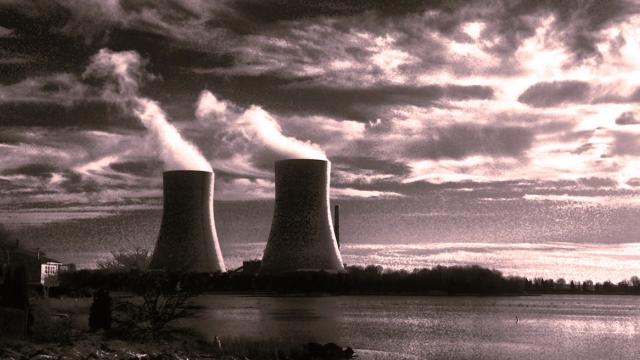
“We can have a much bigger impact on stopping extreme energy extraction with political action on the ground than we can focusing on elections,” says Kevin Zeese, co-director of Popular Resistance, which organizes and reports on activist movements. While the rest of the nation may be winding down mobilization efforts in the wake of election week, Zeese, Popular Resistance and Beyond Extreme Energy are ramping up theirs.
Voting is not enough, says Zeese, because as experience has shown us, serious change comes with, well, popular resistance. As we close out the hottest year in recorded history, it cannot become any clearer through the smog of corporate-sponsored lies that the environment will not wait for the perfect candidate. Nor should we.
We, the people, must supplement our turnout at the polls with our turnout on the streets and in the media in the name of our future on this planet. It's the same idea that brought the Global Climate Convergence to the Peoples Climate March in New York City in September. If “every march needs a movement,” well, every election needs a movement too.
This week, Beyond Extreme Energy and Popular Resistance have actions planned daily in Washington, D.C., that will hold people and government accountable while raising greater awareness about climate change.
Each morning, protests will begin at the Federal Energy Regulatory Commission with a blockade sit-in outside both entrances. FERC, like many government regulatory agencies, has been fiercely co-opted by corporate interests. As a result, those responsible for ensuring the safety of our environment and our health have green-lighted an array of projects that do just the opposite, including interstate natural gas pipelines and liquified natural gas (LNG) terminals used for import/export.
Beyond Extreme Energy has crafted a list of demands including a congressional investigation into FERC's “rubberstamping of industry proposals,” a call for FERC commissioners to meet directly with “communities affected by approved fossil fuel infrastructure,” and a more diligent permit process that holds public health and the well-being of the environment above industries' bottom line.
One key demand on the list involves fracking. What proponents have called the answer to America's energy independence and a "clean alternative" to dirty coal and oil has shown no promise in alleviating our dependence on foreign oil nor has it proven to be anything but environmentally disastrous, with massive groundwater contamination and methane emissions.
This week, activists are calling on FERC to place a moratorium “on all fracked-gas export facilities and other fracked-gas infrastructure.” More specifically, they are demanding that FERC withdraw the permit for a fracked-gas export facility in Cove Point, Md – a site that's currently under construction and, if completed, could lead to a spike in fracking projects across the country.
Because of the low price of fracked gas here in the U.S., investors hope the fracking boom spurs a jump in international sales that brings in huge profits from elsewhere – which is contingent upon the construction of export facilities like Cove Point to export the gas.
For this reason, Cove Point also factors into the week's direct action events. Protestors plan to head to the proposed facility site on election day, Nov. 4, to join local activists in a demonstration. If enough momentum builds, they say, it could slow down construction of the site – and raise the price of the project through delays and litigation, while setting a precedent for other gas export projects.
This kind of targeted protest has worked in the past, says Zeese, causing investors to pull their money out of extreme energy extraction projects once they realize the opposition they are generating.
“We have seen investors pull out of tar sands projects in Alberta because of protests,” he explains. “We've seen the price of these pipelines double in price. The Keystone has doubled in price because of the protests. So blockades and protests do make a big difference.”
And in today's political climate, any economic impacts could provoke broader change. Also high on the list for this week's actions is a demonstration outside the headquarters of the Democratic National Committee, scheduled for Monday afternoon. There protestors will deliver a letter to the DNC outlining its failure to address climate change while, in fact, making matters worse with its all-of-the-above energy strategy favoring the extraction of methane gas, tar sands, coal and off shore oil – a philosophy trumpeted by President Obama.
In the fight against climate change, Democrats have shown themselves to be just as polluted by corporate money as their counterparts across the aisle, says Zeese.
“I'm not sure who's worse: the Republicans who say they don't believe in climate change or the Democrats who say we do believe in climate change but we're going to do things that are counter-productive – like this whole nonsensical, all-of-the-above energy strategy,” he says.
Like the Cove Point action, the delivery of the letter to the DNC carries political and, potentially, economic weight as well: the delivery and publication of the letter makes it public that the people aren't satisfied with a formal admission of climate change, followed by more extreme energy extraction.
“We're putting the Democrats on notice that we are onto them and that when people search 'Democrats climate change,' that this indictment – this letter that describes their faulty and counter-productive energy strategy – will be out there,” Zeese adds. Ultimately, the goal is to force Democratic office holders and candidates to adopt alternative energy plans after facing public outrage and dissent.
Other actions planned this week include protests outside of National Public Radio, which recently cut back its team of environmental reporters to one person while continuing to run pro-fracking ads – all on a station that many Americans still consider to be an "alternative" to mainstream corporate news.
And on Friday, Pennsylvania extractivists will lead an action at the Department of Transportation protesting that agency's policies to expand coal, oil and gas exports endangering the environment and community health.
“This is a long game,” concludes Zeese, who says he doesn't expect the Democrats to fold anytime soon due to so much corporate money in their pockets. What he expects, rather, is exactly what he expected and what many of us saw occur at the Global Climate Convergence and Flood Wall Street actions in New York earlier this fall: the very public display of a growing U.S. movement that refuses to sit back and allow the environment to be scorched, drilled, fractured and poisoned. For that reason, events this week represent another pivotal moment enacting the change we want to see.
For more information and to get involved, visit Beyond Extreme Energy and Popular Resistance. To show your support through donations, go here. Stay tuned here for an update on the actions later this week.
3 WAYS TO SHOW YOUR SUPPORT
- Log in to post comments














